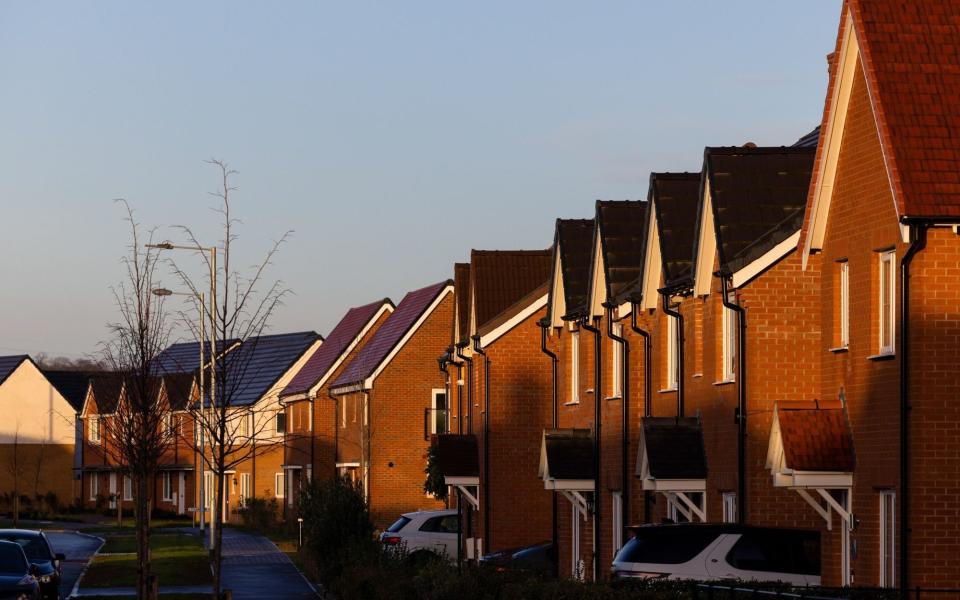Questor: Keep the faith and this housebuilder will deliver

Taylor Wimpey’s latest results will prompt even its most optimistic shareholders to wonder whether they should sell their holding.
The housebuilder’s full-year results showed a 21pc plunge in revenue and a 43pc slump in pre-tax profits versus the prior year as completions dropped by 23pc.
Clearly, these figures are extremely disappointing. The fault, though, does not lie with the company itself. Rather, the wider housebuilding industry is experiencing exceptionally difficult operating conditions that are bound to cause declining completions, sales and profits among its incumbents.
For example, interest rates have risen by five percentage points since the start of 2022, while inflation has been above the Bank of England’s 2pc target since August 2021.
This has resulted in a vast increase in mortgage rates and a squeeze on consumer disposable incomes that naturally equates to lower demand for new homes.
When coupled with a slow-growing economy that is now in recession, it is unsurprising that fewer people are seeking to take the risk of buying a new home.
Taylor Wimpey’s future, though, is almost certain to be very different to its recent past.

While the pace of interest rate cuts is a known unknown, it is highly likely that they will fall significantly over the coming years as declining inflation and a slowing economy put pressure on the Bank of England to stimulate GDP growth.
This should catalyse demand for new homes, thereby creating much improved operating conditions for housebuilders that ultimately leads to higher sales and profits.
In tandem, an undersupply of new homes across the industry is likely to bolster average selling prices over the coming years.
They rose by 5.1pc in the company’s UK segment during its latest full year and are likely to further increase as sector-wide housing starts in the year to September 2023 stood at just 192,000.
Given that the UK’s population growth is forecast to average 450,000 per year between now and 2036, the current supply/demand imbalance is poised to worsen.
Taylor Wimpey is in a strong position to capitalise on an improving industry outlook.
Although its net cash position declined from £864m to £678m in the latest financial year, it remains more than sufficient to overcome short-term financial challenges posed by a weak operating environment.
It has also become more efficient, with annualised cost savings of £19m generated during the year, while maintaining its five star Home Builders Federation customer service rating.
Its landbank, meanwhile, amounts to around 80,000 plots that equates to over seven times the number of completions in the company’s latest financial year.
This combination of a high-quality company that is temporarily facing challenging trading conditions is, in Questor’s view, the perfect union for long-term investors.
It means they can purchase the stock at a discount to its intrinsic value so as to generate high capital gains over future years while minimising the risk of permanent capital loss.
In Taylor Wimpey’s case, its shares now trade on a price-to-book ratio of just 1.1. This equates to a wide margin of safety that adequately compensates investors for potential threats such as higher than expected cladding-related costs, political risks from the upcoming election and the potential for a further deterioration in the economy’s performance in the short run.
It also provides generous scope for capital growth as profits rise and investor sentiment improves in response to economic expansion.
The stock’s dividend yield of 6.8pc adds to its overall appeal, with the company aiming to return 7.5pc of net assets, or at least £250m, to shareholders each year.
While dividends were only narrowly covered by profits in the latest financial year, which suggests they could come under pressure in the short run, they are likely to rise in tandem with growing profits over the long run.
Since first being tipped by this column in October 2018, the company’s share price has fallen by 12pc.
Dividends amounting to 31pc of our notional purchase price have, however, been paid or announced. This means our total return stands at 19pc.
While this represents a disappointing performance over an extended time period, Taylor Wimpey offers excellent long-term investment potential.
It has the financial standing to survive ongoing industry challenges and the market position to capitalise on growing demand for new homes as the economy’s outlook improves.
Therefore, rather than selling their holding, existing investors should continue to buy what is a high-quality company while its shares are temporarily suppressed by transient sector-related difficulties.
Questor says: buy
Ticker: TW
Share price at close: 140.55p
Read the latest Questor column on telegraph.co.uk every Sunday, Monday, Tuesday, Wednesday and Thursday from 8pm.
Read Questor’s rules of investment before you follow our tips


 Yahoo Finance
Yahoo Finance 